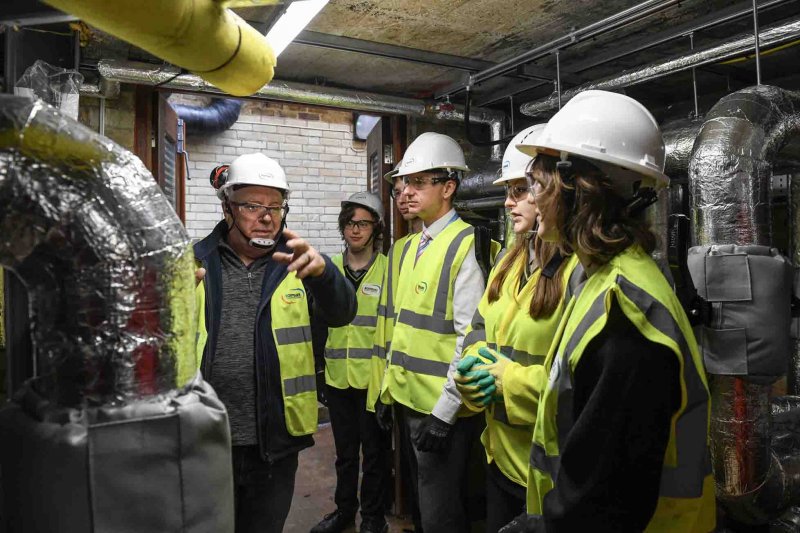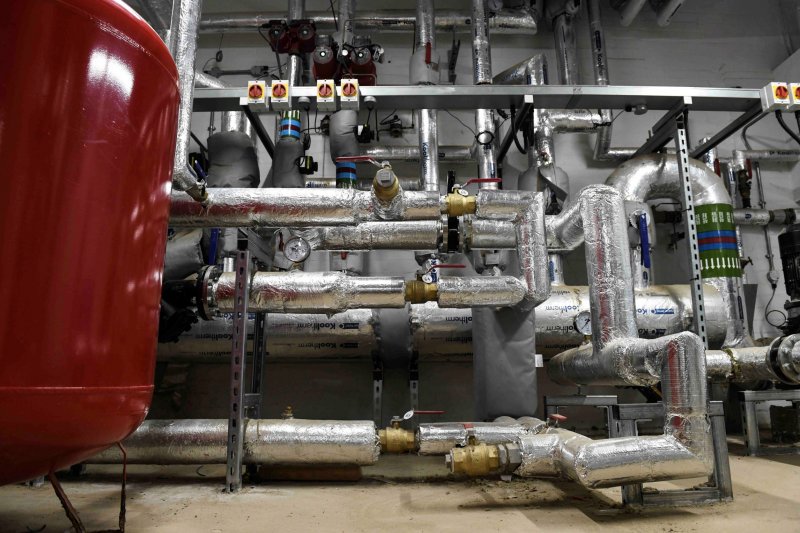Comberton goes Greener
20th March 2023
A multi-million pound 18-month innovative renewable heat network at Comberton Village College is now up and running.
The £3.1m project means the college, just outside Cambridge, is now heated by Ground Source Heat Pumps, which have replaced the aging oil boilers, reducing the carbon emissions from heating the extensive site by 70%. It will be officially unveiled in a ceremony this afternoon.
In addition to achieving significant carbon savings, the college is expected to see a reduction in cost of running the low carbon heating system compared to oil.
The project has been a collaboration between The Cam Academy Trust, which oversees the college, Cambridgeshire County Council and Bouygues Energies & Services. The college’s heat network supplies 11 plant rooms across the site. Heat is supplied by two ground source heat pumps which are connected to 60, 200m deep boreholes, providing a peak of 705kW of heating to the college.

The project has been funded by £1.9 million government grant from Phase 2 of the Public Sector Decarbonisation Scheme (PSDS) and a £1.2 million investment from Cambridgeshire County Council. The PSDS scheme was initiated by the Department for Energy Security and Net Zero and is delivered by Salix Finance. PSDS aims to put the public sector at the forefront of decarbonising buildings in the UK.
Stephen Munday, Cam Academy Trust Chief Executive, said: “We are absolutely delighted to have been able to help to oversee this major development at Comberton Village College. From every perspective, this has to be judged a very good and a very desirable way forward. We are strongly committed to green environmental approaches across all our schools, both in terms of education and approaches to our sites. This is a very powerful example of this. It also makes complete sense in terms of future energy costs and putting more of our future funding into education provision rather than high energy bills. It is the sort of investment in public buildings that many of us would want and hope to see across our country moving forward.”

Councillor Lorna Dupré, chair of Cambridgeshire County Council’s Environment & Green Investment Committee, said: “Our vision is to deliver net-zero carbon emissions for Cambridgeshire as a county by 2045. The Comberton Village College project is a great example of how the county council is working in communities with stakeholders like Bouygues Energies & Services and the Cam Academy Trust to deliver this. The low carbon heat network not only ensures that we are doing our part to tackle climate change but is also a great example of how to retrofit low carbon heating on other sites.”
Salix Finance Programme Manager, Kirsty Adamson said: “We are delighted to see how this project has progressed and to understand how well the different stakeholders have worked together. The Comberton Village College is a truly collaborative project which will help Cambridgeshire County Council meet its ambitious net zero targets. Hopefully this will inspire, not only other schools to decarbonise their estates, but of course the future generations coming up through the education system.”
Miles Messenger, Energy Engineering Director at Bouygues Energies & Services, stated: “We are proud to have successfully delivered this innovative low carbon heat network scheme at Comberton Village College for Cambridgeshire County Council to help them meet their net zero target. The project will not only deliver significant energy and cost savings, but is testament to the Authority’s and the college’s commitment to addressing the climate emergency. As an energy and engineering partner, we’ve supported in translating this commitment into a successful project. This unique scheme is just one example of how we can deliver a significant long-term carbon reduction safely and with minimal disruption to the site’s operation in a live school environment.”

The project has been funded by a £1.9 million Public Sector Decarbonisation Scheme from Salix and £1.2 million investment from Cambridgeshire County Council. A lease between the Council and the Trust allows the Council to recover its investment, with the savings delivered on energy bills funding the Trust’s lease payments. The project has been delivered by Bouygues Energies & Services, a global leader in energy, digital and industrial transformation, for Cambridgeshire County Council under the terms of the Re:fit 3 Framework Agreement. The Re:fit programme is a successful, national framework, developed by the Greater London Authority and Local Partnerships, for energy efficiency and local energy generation projects in the public sector. A key feature of the project is a performance guarantee on the projected energy savings.
The low carbon heat network will reduce carbon emissions from the college’s heating by 248 tonnes of CO2e (a 70% reduction). The 141kW solar photovoltaic arrays previously installed by Bouygues Energies & Services across three roofs also help to power the heat pumps.

 resized.jpg)






.jpg)